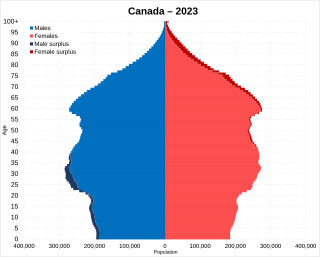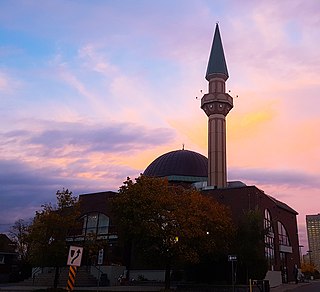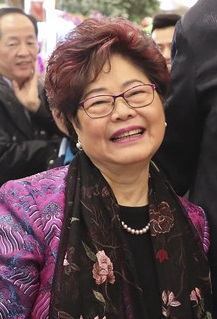
Statistics Canada conducts a country-wide census that collects demographic data every five years on the first and sixth year of each decade. The 2021 Canadian census enumerated a total population of 36,991,981, an increase of around 5.2 percent over the 2016 figure, Between 2011 and May 2016, Canada's population grew by 1.7 million people, with immigrants accounting for two-thirds of the increase. Between 1990 and 2008, the population increased by 5.6 million, equivalent to 20.4 percent overall growth. The main driver of population growth is immigration, and to a lesser extent, natural growth.

Islam in Canada is a minority religion practised mostly by the immigrants and their descendants from Muslim majority countries. Muslims have lived in Canada since 1871 and the first mosque was established in 1938. Most Canadian Muslims are Sunni, while a significant minority are Shia and Ahmadiyya.

Healthcare in Canada is delivered through the provincial and territorial systems of publicly funded health care, informally called Medicare. It is guided by the provisions of the Canada Health Act of 1984, and is universal. The 2002 Royal Commission, known as the Romanow Report, revealed that Canadians consider universal access to publicly funded health services as a "fundamental value that ensures national health care insurance for everyone wherever they live in the country."
Equal pay for equal work is the concept of labour rights that individuals in the same workplace be given equal pay. It is most commonly used in the context of sexual discrimination, in relation to the gender pay gap. Equal pay relates to the full range of payments and benefits, including basic pay, non-salary payments, bonuses and allowances. Some countries have moved faster than others in addressing equal pay.
The Demographics of Montreal concern population growth and structure for Montreal, Quebec, Canada. The information is analyzed by Statistics Canada and compiled every five years, with the most recent census having taken place in 2016.
A visible minority is defined by the Government of Canada as "persons, other than aboriginal peoples, who are non-Caucasian in race or non-white in colour". The term is used primarily as a demographic category by Statistics Canada, in connection with that country's Employment Equity policies. The qualifier "visible" was chosen by the Canadian authorities as a way to single out newer immigrant minorities from both Aboriginal Canadians and other "older" minorities distinguishable by language and religion, which are "invisible" traits.

According to the 2021 Canadian census, immigrants in Canada number 8.3 million persons and make up approximately 23 percent of Canada's total population. This represents the eighth-largest immigrant population in the world, while the proportion represents one of the highest ratios for industrialized Western countries.

Anna Marina Terrana was the elected Member of Parliament (MP) for the constituency of Vancouver East in British Columbia, Canada, serving as that riding's MP from 1993 to 1997 in the Canadian House of Commons - 35th Parliament. Terrana sat as a member of the Liberal Party of Canada.
The Canadian Human Rights Commission (CHRC) was established in 1977 by the government of Canada. It is empowered under the Canadian Human Rights Act to investigate and to try to settle complaints of discrimination in employment and in the provision of services within federal jurisdiction. The CHRC is also empowered under the Employment Equity Act to ensure that federally-regulated employers provide equal opportunities for four designated groups: women, Aboriginal people, the disabled, and visible minorities. The Commission helps enforce those human rights and inform the general public and employers of those rights.

The economic impact of immigration is an important topic in Canada. Two conflicting narratives exist: 1) higher immigration levels help to increase economy (GDP) and 2) higher immigration levels decreases GDP per capita or living standards for the resident population and leads to diseconomies of scale in terms of overcrowding of hospitals, schools and recreational facilities, deteriorating environment, increase in cost of services, increase in cost of housing, etc. A commonly supported argument is that impact on GDP is not an effective metric for immigration. Another narrative for immigration is replacement of the ageing workforce. However, economists note that increasing immigration rates is not an effective strategy to counter this entirely. Policy Options found that mass immigration has a null effect on GDP. Increased immigration numbers and the associated soaring housing prices has significantly contributed to the rise of inflation in 2021 to the highest in 18 years.
Employment equity, as defined in federal Canadian law by the Employment Equity Act, requires federal jurisdiction employers to engage in proactive employment practices to increase the representation of four designated groups: women, people with disabilities, Indigenous peoples, and visible minorities. The act states that "employment equity means more than treating persons the same way but also requires special measures and the accommodation of differences".

Alice Wong Chan Siu-ping is a Canadian politician and a member of the Conservative Party who served as the member of Parliament (MP) for the electoral district of Richmond Centre from 2015 to 2021. She previously served as the MP for the Richmond riding from 2008 to 2015. In 2011, she was appointed by Prime Minister Stephen Harper to be Minister of State for Seniors, becoming the first Chinese-Canadian woman to serve in the Cabinet of Canada. She served in that position until 2015.

Canadians are people identified with the country of Canada. This connection may be residential, legal, historical or cultural. For most Canadians, many of these connections exist and are collectively the source of their being Canadian.
Racism in Canada traces both historical and contemporary racist community attitudes, as well as governmental negligence and political non-compliance with United Nations human rights standards and incidents in Canada. Contemporary Canada is the product of indigenous First Nations combined with multiple waves of immigration, predominantly from Europe and in contemporary times, from Asia.
LGBT migration is the movement of lesbian, gay, bisexual, transgender, and queer (LGBT) people around the world and domestically, often to escape discrimination or ill treatment due to their sexuality. Globally, many LGBT people attempt to leave discriminatory regions in search of more tolerant ones.
Islamophobia in Canada refers to a set of discourses, behaviours and structures which express feelings of anxiety, fear, hostility and rejection towards Islam or Muslims in Canada.

Anita M. Vandenbeld is a Canadian politician, who was elected to represent the riding of Ottawa West—Nepean for the Liberal Party of Canada in the House of Commons of Canada in the 2015 Canadian federal election. She was re-elected in the same riding in 2019, and re-elected in 2021.
The Citizenship (Amendment) Act, 2019 (CAA) was passed by the Parliament of India on 11 December 2019. It amended the Citizenship Act, 1955 by providing an accelerated pathway to Indian citizenship for persecuted religious minorities from Afghanistan, Bangladesh and Pakistan who are Hindus, Sikhs, Buddhists, Jains, Parsis or Christians, and arrived in India before the end of December 2014. The law does not grant such eligibility to Muslims from these countries. The act was the first time that religion had been overtly used as a criterion for citizenship under Indian law, and it attracted global criticism.
The Congress of Black Women of Canada (CBWC) /Congrès des femmes noires du Canada, which began in 1973, is a national non-profit organization that "is dedicated to improving the lives of all Black women and their families in their local and national communities." It arose to organize Canadian Black women and focus on their specific issues and concerns, separate from the general women's movement and Black nationalist organizations, which did not always represent the interests of Black women around issues of race, gender, and class oppression. The organizing and advocacy work of the CBWC has focused on "such issues as health, housing, racism, education, immigration, criminal law, police-community relations and child development."
Carmencita "Ging" Hernandez was a Philippine-born activist most notable in her part in the anti-Marcos movement and women's rights movement in Canada.






